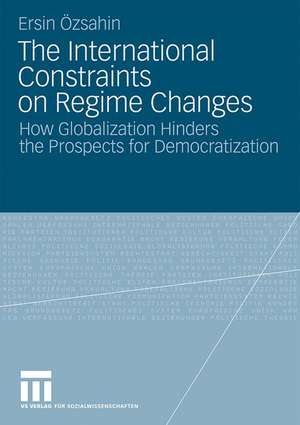The International Constraints on Regime Changes: How Globalization Hinders the Prospects for Democratization
Autor Ersin Oezsahinen Limba Engleză Paperback – 11 feb 2010
Preț: 381.00 lei
Nou
Puncte Express: 572
Preț estimativ în valută:
72.90€ • 79.44$ • 61.43£
72.90€ • 79.44$ • 61.43£
Carte tipărită la comandă
Livrare economică 23 aprilie-07 mai
Preluare comenzi: 021 569.72.76
Specificații
ISBN-13: 9783531169866
ISBN-10: 3531169866
Pagini: 204
Ilustrații: 204 p. 25 illus.
Dimensiuni: 148 x 210 x 15 mm
Greutate: 0.25 kg
Ediția:2010
Editura: VS Verlag für Sozialwissenschaften
Colecția VS Verlag für Sozialwissenschaften
Locul publicării:Wiesbaden, Germany
ISBN-10: 3531169866
Pagini: 204
Ilustrații: 204 p. 25 illus.
Dimensiuni: 148 x 210 x 15 mm
Greutate: 0.25 kg
Ediția:2010
Editura: VS Verlag für Sozialwissenschaften
Colecția VS Verlag für Sozialwissenschaften
Locul publicării:Wiesbaden, Germany
Public țintă
Professional/practitionerCuprins
The economic constraints on regime changes – notes towards a coherent formalization.- Modeling transition.- Research design.- Results.- Conclusion.
Notă biografică
Ersin Özsahin is researcher at the department of political science, Johannes Gutenberg-Universität Mainz.
Textul de pe ultima copertă
Does integration into international markets and political co-operation help to build democracy? This question is motivated by an interesting empirical observation: between 1950 and 2000 the magnitude of international trade and co-operation increased rapidly while the majority of the observed regime transitions did not establish democratic rule but various types of authoritarianism. The study employs a game theoretic model that explicitly accounts for democratization and developments towards authoritarianism. Additionally it suggests utilizing an unconventional measure of regime change that considers positive and negative meaningful institutional changes as well as minor alterations. By applying various regression models it can be shown that strongly integrated authoritarian regimes are less likely to develop towards democracy. While less integrated regimes rather democratize, increasing levels of integration into global markets are likely to stabilize authoritarianism. Moreover, if integrated regimes alter, they are more likely to shift towards stricter authoritarianism.
The findings motivate to rethink the common academic and political perception that international co-operation and integration foster democratization. The results of this examination strongly question the efficiency of policies that rely on this perception.
The findings motivate to rethink the common academic and political perception that international co-operation and integration foster democratization. The results of this examination strongly question the efficiency of policies that rely on this perception.
Caracteristici
How globalization hinders the prospects for democratization













